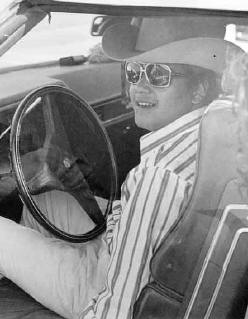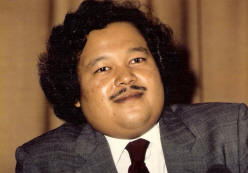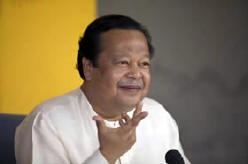Behind the Scenes
Prem Rawat lives a life that is at complete variance to the renunciate style that he once recommended for his followers. It is tempting to compare the way that Prem Rawat conducts his life with that of a wealthy and reclusive celebrity, however Rawat's own self image suggests something closer to a 'Captain of Industry' - someone for whom the rewards of decision making brings an entitlement to Rolls Royces, an executive jet, an ocean going 'mega yacht', a personal chef, a branded watch collection and a mansion on every continent.
Prior to the inception of the Internet, most criticism made of Prem Rawat had come from the mainstream media, and centred on Rawat's lifestyle. This criticism began in the early 1970s, when the press drew attention to Prem Rawat's liking for Baskin Robbins ice cream, cowboy boots and luxury cars.
The first 'inside' reports on Prem Rawat's lifestyle came in the 1979. Bob Mishler, who had been fired as the President of the US Divine Light Mission Incorporated in January 1977 claimed in a Radio Interview that Prem Rawat had put his (Rawat's) own financial well-being ahead of his mission. His mental and physical health were intimately tied to his materialism and over-eating and the strain of acting out his role even hospitalised him with an ulcer when he was 15 years old.
And for a few months we tried to change things, and what it really came down to was that Maharaj Ji was not willing to take the financial risk involved. I had set up a program to use the tax-free income that he was getting in gifts from the premies to create a program of investments for him, so that ultimately he could live off his invested capital, and not need to have the premies keep making incredible contributions to him - not need to have Divine Light Mission give so much of its money to him to maintain his lifestyle. … The program never really got off the ground because he was too worried about it. It meant that he would have to really compromise his lifestyle.
"By the time I left", Mishler said, "he must have had at least three Mercedes, a couple of Rolls Royces, and least three or four other luxurious automobiles in the 30 or 40,000 dollar range … Materialism is like a disease with him".
Mike Finch writes of Rawat's first years in England: "I drove him to Harrod's often, which was his favourite destination, and several times we were there all day. He had a fascination for the watches department." - p.90 Without the Guru. Jos Lammers writes of Rawat's tours of Europe in the mid 1970's:
"He didn't have contact with the premies that welcomed him to their country, but if he went to see the city, which he liked to do, they had to come along. To pay. The watches in Switzerland, I still remember well. One shop after another. Together with the national general secretary I followed the small group that hung around Maharaj ji like a cloud on his tour of the shiny showcases. We didn't see much of him at all. We heard his voice though when he asked a shop assistant to get a watch from behind the bullet-proof glass. When he liked what he saw, Bob Mishler signaled in our direction. Pay. While we were still finishing up doing that, the cloud had already drifted into the next jewelry shop." - p.69 Abandoned Roads
Mishler also claimed Rawat had a serious drinking problem, an accusation corroborated by many others:
"Rawat drank heavily, to the point that he was stewed every evening. There was more than one occasion where we had to carry him to bed after he had passed out."
"By 1976, Rawat (then still known as Guru Maharaj Ji) had degenerated physically to the point that he was having these fainting spells, and we had had it diagnosed and found out that there was no physical cause for it, it was psychosomatic. It was just obvious that he was living with too much stress. He hated to hear about the premies. I felt that this burden of playing God for people was killing him, as well as being injurious to the premies, and we had agreed essentially to change things.
Mishler's claims had little effect on premies at the time, as few read the newspapers or listened to the radio programs on which they were aired. Other close followers have confirmed Rawat's greed.
Prior to Mishler's departure from DLM, Canadian Michael Dettmers was appointed his deputy, Dettmer's was summarily sacked by Rawat as Mishler's deputy (despite Rawat having no legal power over DLM employment issues) but immediately given the position of Rawat's personal manager, a post he held until 1987. Dettmer's position as Rawat's 'right hand' brought with it the effective position of Divine Light Mission 'International President', a role previously accorded to Bob Mishler on the basis of his holding the joint positions of US DLM President and Prem Rawat's personal assistant. As the various National Divine Light Missions were separately constituted under differing legal regimes no legally constituted position of 'International President' in fact ever existed. Once Mishler had left, the role of President of the US DLM was downgraded, none of the subsequent incumbents ever having organisational primacy over Michael Dettmers.
Mishler died in a helicopter accident in 1979. But in 2002, Dettmers (by then no longer working for Rawat) went public with his recollections of their time together. He supported Mishler's view that Rawat was 'an alcoholic'. "When he gets drunk," he stated, "he becomes very negative. He becomes abusive in the sense that he verbally trashes certain people." Rawat, Dettmers added, had also been in the habit of smoking pot "four or five nights a week". Dettmers arranged with premie women to provide Rawat with sexual favours. The women, he said, were invariably promptly dropped, which resulted in 'upset and confusion'.
According to Dettmers and other close aides from this period such as Michael Donner, North American DLM National Co-ordinator, Prem Rawat's lifestyle was shielded from premies by a system known as X-Rating. 'X-Rated' premies were those 'cleared' to become privy to Rawat's drinking, drug-taking, cigarette-smoking and sexual liaisons. But they were to keep their knowledge of these activities from Rawat's other devotees (most of whom were on low incomes or living monastic lifestyles - and frequently both).
"After a while," Dettmers said, "I concluded that there was a strong correlation between his failing mission and the fact that he was slightly inebriated, if not out-and-out drunk, five out of seven days of every week for years on end." After 12 years as his right hand man, Dettmers left Rawat's service in 1987.
Although premies are not generally apprised of the extent of his assets, Rawat has never tried to hide that he lives very well. Most of Rawat's remaining followers believe he more than deserves his lifestyle, indeed some even express gratitude for the opportunity to give him money and gifts, believing the 'Knowledge' he has given them is priceless something he has told them again and again.
The level of care afforded Prem Rawat by his personal staff, who must always strive to be impeccable, is exceptional and those working in the Rawat residences endeavour to move any object that Rawat might touch as close as possible to where he might be passing, to reduce his levels of exertion. According to a 2002 newspaper article, a team of women regarded as especially trustworthy "shower and meditate" before scrubbing clean every inch of the backstage area used by Prem Rawat at the Ivory's Rock Conference Centre in Australia when he is in residence there.
The meat for Rawat's Amaroo barbecues comes from a calf chosen by premies as "the one with the nicest nature" of the herd, and is massaged before being slaughtered, to ensure maximum tenderness. The wood for the barbecue is stacked, with excruciating neatness, over several hours - including a heart-shaped hollow in the middle of the pile.




